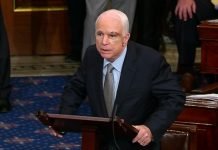Last year, Wall Street banks paid out more than $28 billion in bonuses to its 167,000 employees, the Institute for Policy Studies (IPS) reported. To put that in perspective, the $28.5 billion-worth of bonuses is more than double what all 1,007,000 minimum-wage workers in America earn annually — combined.
Bonuses last year were actually up three percent from 2013, despite an overall a 4.5 percent decrease in industry profits. The bonuses were also up 27 percent from 2009, when the federal minimum wage was increased to its current $7.25 an hour.

“Wall Street’s bonus culture, we learned from the 2008 financial industry meltdown,” said the IPS report, “creates an incentive for high-risk behaviors that endanger the entire economy. A large share of low-wage earners, on the other hand, spend every working day meeting basic human needs, such as providing food services and taking care of the disabled and elderly.”
The IPS report found that the bonus pool in 2014 was so large, it would actually be “far more than enough to lift all 2.9 million restaurant servers and bartenders, all 1.5 million home health and personal care aides, or all 2.2 million fast food preparation and serving workers up $15 per hour.”

The study also found that raising the minimum wage, rather than giving more money to the already-wealthy bankers, would actually have a greater impact on the economy as a whole.
“All those dollars low-wage workers spend create an economic ripple effect. Based on standard fiscal multipliers established by Moody’s Analytics, every extra dollar going into the pockets of a high-income American only adds about $0.39 to the GDP. By contrast every extra dollar going into the pockets of low-wage workers adds about $1.21 to the national economy.”
If the $28.5 billion in bonuses had gone to the more than one million minimum-wage workers, the GDP would have grown by $34.5 billion — more than triple the $11.1 billion increase expected from giving the money to Wall Street bankers.
Regulations in the Dodd-Frank financial reform legislation were included to prohibit the financial industry from pay packages that encourage “inappropriate risks,” but proposals from financial industry-regulators (who often work, or recently worked, inside the industry) ignored much of what should have been learned from the Great Recession.
They want pay restrictions to only affect top executives, “leaving off the hook financial traders and other employees whose activities could put the financial system at risk,” and therefore encouraging many of the same behaviors that caused the meltdown in the first place
Click here to read IPS’s full report.




